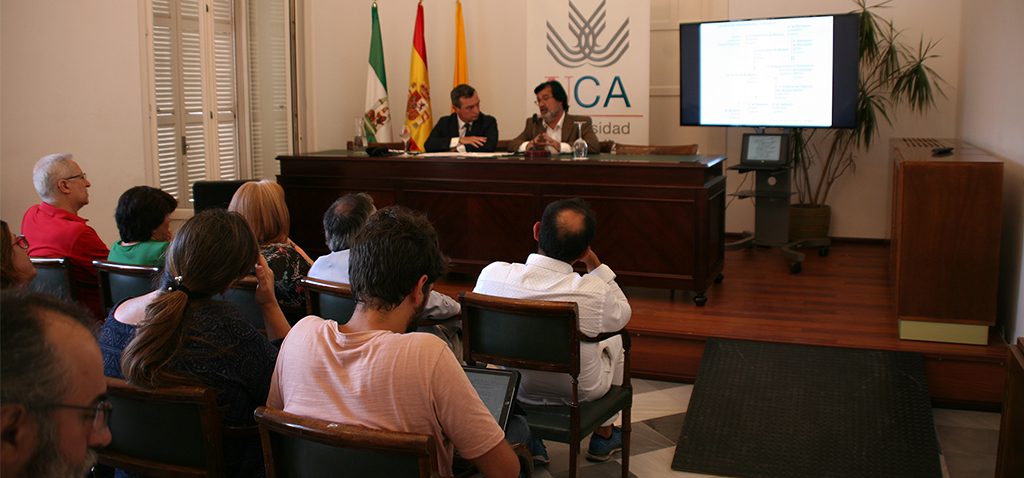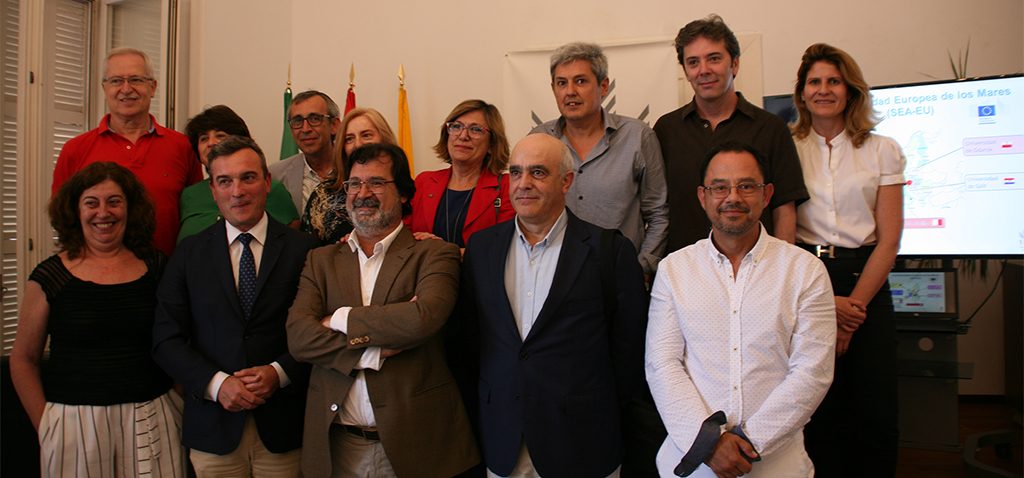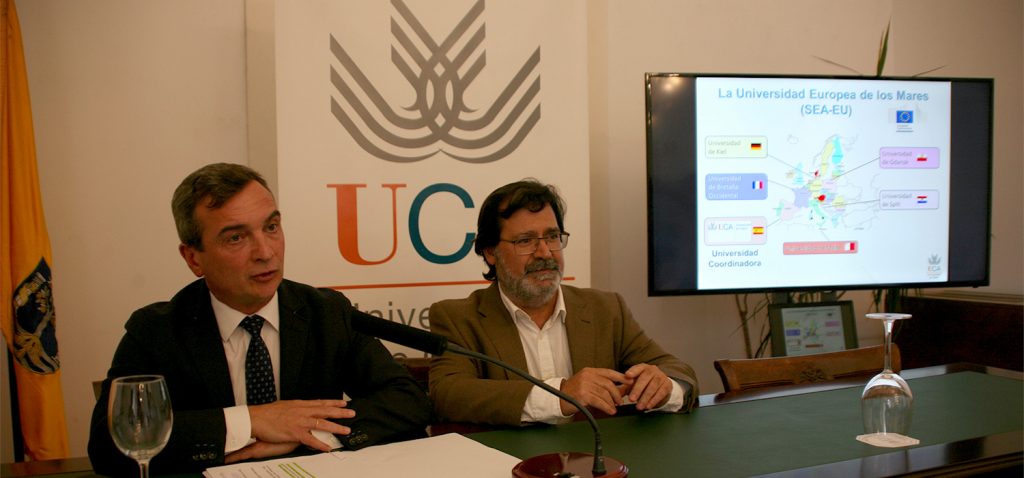The project coordinated by UCA is among the 17 approved by the EC. Three Spanish universities, among the coordinators of the selected projects.
The University of Cádiz has been selected today by the European Commission (EC) to develop the project of the European University of the Seas (SEA-EU) within a first call, whose objective is the articulation of a new European model of cooperation between universities on the 2025-30 horizon. In this way, the European institutions have evaluated and selected the unique alliance of the six universities participating in the SEA-EU consortium: Cádiz (coordinator) Western Brittany (France), Kiel (Germany), Gdańsk (Poland), Split (Croatia) and Malta.
.
With this call, the European Commission pursues different objectives, such as the promotion of common European values enshrined in Article 2 of the Treaty on European Union, the achievement of a substantial jump in quality, performance, attractiveness and international competitiveness in the field of higher education European institutions to, thus, contribute to the economy, employment, culture and well-being of European knowledge.
.
After the resolution was made public, the project of the European University of the Seas (SEA-EU), coordinated by UCA, was among the 17 approved by the European Commission, finding three Spanish universities among the coordinators of the various selected projects: Cádiz, Barcelona and Granada. In total, there are 11 university institutions of our country that participate in the different projects finally approved: Cádiz, Granada, Complutense of Madrid, Autónoma of Madrid, Barcelona, Autónoma of Barcelona, Pompeu Fabra, Polytechnic of Catalonia, Valencia, Catholic of Valencia and Carlos III of Madrid.
To this first call, 54 proposals for alliances formed by different European universities have been presented, which have been evaluated by a panel of 26 independent experts, who have finally selected 17 projects representing 114 higher education institutions from 24 member states of the EU. Each project has had to overcome a total of three external evaluations that have taken into account the relevance of the proposal (25), the geographical balance (15), the quality and execution of the proposal (20) and the quality of the agreements of the cooperation of the alliance (20).
.
In the opinion of the Acting Rector of UCA, Eduardo González Mazo, today “we are in luck and from today we are also the European University of the Seas”. To reach this point, we had to start at the end of 2017 a “rigorous, quiet and committed” process and “get to work and move forward”. A task, where we have had “the good fortune of having the rigor and the illusion” of Professor José Antonio Muñoz Cueto, delegate of the Rector for the European Universities of UCA. A complex task because “choosing universities is not easy”. For this – he said, “we must be positioned to build trust” and, in this context, “the CEI·Mar has been a formidable presentation card”. UCA generates trust and has been able to coordinate a consortium. “We are in the south of the south” and, from here, we have been able to “lead this consortium at the first call”, he underlined.
One project, Gonzalez Mazo has said, that “has a common and initial core in the marine field, but it is not marine qualifications exclusively, but a European campus for all types of disciplines” and that puts us “in a historic moment for our university, the province and Andalusia, since a very hopeful future is open wide “. Finally, he stressed that being in charge of a consortium of this “caliber, size and international dimension allows us to be at the forefront in the context of national and European universities with a rigorous, ambitious, innovative, responsible, sustainable and transformer project for the future.” Thus, “we have shown again that we are perfectly capable to lead international projects, to be at the vanguard and with the best and that we can achieve with effort, rigor and commitment everything we want because of our academic and scientific potential”.
.
For his part, Muñoz Cueto, said that it is “a big day for UCA” one which represents the “culmination of a work developed these years” and in which the Delegation of the Rector for Strategic Development, the Directorate of Institutional Relations, different vice-rectorates, as well as our doctoral schools have taken part. An achievement for a university that “with 40 years is where it should be to be much further in the future”. At the same time, he stressed that it is the first “integrator” European project that “puts for the first time education and culture in the center of Europe.” It is this, he concluded, “a bandwagon from which we can not jump off” so that, among all participating universities, in a coordinated manner “we can make it a reality and not an attempt”.
The project of The European University of the Seas (SEA-EU) is structured through a set of key ideas: the development of long-term inclusive and sustainable educational projects, the promotion of European values and identity, the creation of a model for other European and non-European universities, the promotion of a series of values that are implemented through common governance, the articulation of combined studies in several countries and the increase in the mobility of students and staff, as well as the promotion of innovative methodologies and practical lessons aimed at the labor market or the mutual recognition of degrees.
.
The selection by the European Commission of the project entails a financing of five million euros for its development with an estimated initial duration of three years.
A new model
This first “pilot” call for European universities aims to lay the foundations for the configuration of a new European model of universities, where these institutions of higher education are conceived as factors to boost the quality of higher education and to strengthen their link with the research and innovation landscape in Europe and its scope for society and the economy.
.
In this context, each alliance will have the flexibility to shape its joint work program of activities. Thus, it is intended to go beyond the current models of cooperation in higher education, to advance in the levels of integration and promote a common governance that allows to share resources, services, data and infrastructures. The aim is for these European universities (such as the SEA-EU) to act as models through transnational teams of students, professors and researchers, capable of generating knowledge and addressing the challenges of society.
In this way, common, relevant and efficient management structures are considered, establishing joint panels, developing common intellectual and administrative resources, as well as a distribution of shared resources and a common estimate of infrastructures, data and services (support for students, researchers and personnel, administration and international relations, etc.).
.
The call aims to forge new models of cooperation in higher education, promoting mobility and teaching and learning quality. Therefore, it moves forward in the levels of integration between institutions of higher education. The figure of the European universities is projected towards the constitution and development of a European campus that reinforces the identity of Europe through education and culture.





